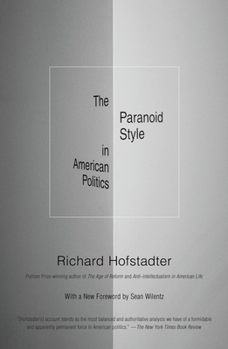The Paranoid Style in American Politics
Select Format
Select Condition 
Book Overview
This timely reissue of Richard Hofstadter's classic work on the fringe groups that influence American electoral politics offers an invaluable perspective on contemporary domestic affairs.In The Paranoid Style in American Politics , acclaimed historian Richard Hofstadter examines the competing forces in American political discourse and how fringe groups can influence - and derail - the larger agendas of a political party. He investigates the politics...
Format:Paperback
Language:English
ISBN:0307388441
ISBN13:9780307388445
Release Date:June 2008
Publisher:Vintage
Length:368 Pages
Weight:0.63 lbs.
Dimensions:0.8" x 5.3" x 8.0"
Customer Reviews
3 ratings
No More Bipartisan Red Herrings
Published by Thriftbooks.com User , 14 years ago
In an era when hate mongering, fear mongering, and divisiveness seem to be the order of the day, Hofstadter's essays help identify the roots of the paranoid style in American politics. Perhaps, now that this book has been republished, more people will read his essays, and work together to assuage the extreme fears and resentments that drive the paranoid style.
The More Things Change. . .
Published by Thriftbooks.com User , 14 years ago
I read this book when it was first published in the 1960's. Now, gee, just when I had completely forgotten about it, along comes the Tea Party movement and those wackoes declaring Obama the first Communist president since Eisenhower, and others shouting racial and homophobic epithets at congressmen. As I recall, Prof. Hoffstedter said this kind of uprising occurs about once every 20 years or so (and, here in the Pacific Northwest, I recall the Posse Comitatus crowd in the late 1970's who believed the IRS was illegal because Ohio wasn't a state, or something like that, so this sort of thing seems about as regular as Halley's Comet, just more frequent and less exciting to watch). But I suppose that if the original Tea Party in 1773 had just shortened their slogan to, "No taxation," either we would have begun the American Revolution a little sooner, or (more likely)the American revolutionaries would have been written off as a bunch of nut jobs and all the rest of us would still be singing God Save the Queen. But Hoffstedter's book really made sense of these periodic paroxysms in our society and, thanks to the wackoes, the book retains its great vitality and relevance. Be sure to buy the book now, though, before the Stamp Act party returns in 2030. And I can't wait for the Know-Nothings (or are they hiding amidst the Tea Party?)
The more things change...
Published by Thriftbooks.com User , 15 years ago
Don't be put off by the lame cover design. The late Mr. Hofstadter's book deserves your attention, particularly in light of recent American history. 'The Paranoid Style' is in fact a collection of essays, the first four of which are thematically-related studies of American hyper-conservatism. (I won't discuss the other essays in this review.) In the first, Hofstadter brings to light earlier historical avatars of conservative paranoia, reaching back to 18th century fears of 'Illuminati' and Freemasons, and 19th century anti-Catholic sentiment. Hofstadter then contextualizes the then-current anti-communist movement and McCarthyism as the latest examples of a 'style' of American political rhetoric that cannot brook coincidence, and that, in contrast, prefers to see historical events, which are largely beyond our control, as the evidence of a vast and perfect conspiracy to destroy America and its values. In the next essays, Hofstadter engages with what he calls 'pseudo-conservatism,' a philosophy embodied in those ultra-right wing movements that do not seek to conserve or guide our social institutions at all, but instead wish to tear them out root and branch, on the grounds of their complete and utter corruption. At the time, Hofstadter's targets were right-wing organizations like the John Birch Society, but above all Barry Goldwater and his supporters. These 'pseudo-conservatives' rejected completely the moderate Republican leadership of the time, and sometimes went so far as to accuse them of treason. What the pseudo-cons offered instead of the generally successful continuation of New Deal social policy or the careful stand-off of the Cold War, was the complete reversal of government intervention into social welfare and a hyper-aggressive stance toward communism that did not deem global thermo-nuclear war to be an unacceptable outcome. The portrait of Barry Goldwater is particularly chilling. Goldwater's instrumentalization of 'moral values' as an electoral wedge, and his Manichean and apocalyptic vision of world politics -- reflected in the title of his book "Why not Victory?" - thankfully did not seduce the American electorate of 1964. But Goldwater's influence on Ronald Reagan and George W. Bush is beyond dispute.





